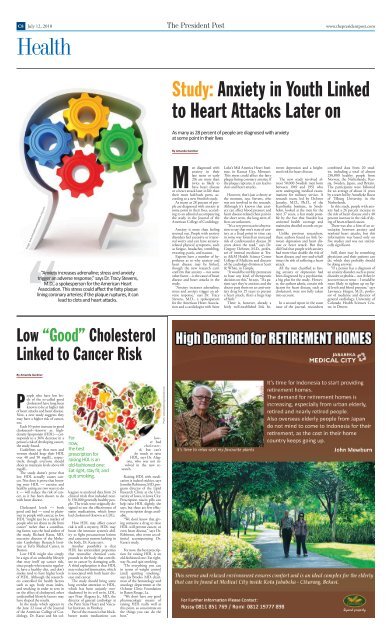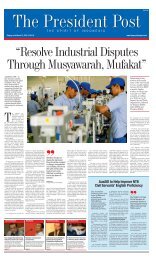Mari Pangestu: The Champion of Free Trade - The President Post
Mari Pangestu: The Champion of Free Trade - The President Post
Mari Pangestu: The Champion of Free Trade - The President Post
Create successful ePaper yourself
Turn your PDF publications into a flip-book with our unique Google optimized e-Paper software.
C8<br />
July 12, 2010<br />
<strong>The</strong> <strong>President</strong> <strong>Post</strong><br />
www.thepresidentpost.com<br />
Health<br />
Study: Anxiety in Youth Linked<br />
to Heart Attacks Later on<br />
As many as 28 percent <strong>of</strong> people are diagnosed with anxiety<br />
at some point in their lives<br />
By Amanda Gardner<br />
Image: www.competitiveintelligence.ning.com<br />
“Anxiety increases adrenaline; stress and anxiety<br />
trigger an adverse response,” says Dr. Tracy Stevens,<br />
M.D., a spokesperson for the American Heart<br />
Association. This stress could affect the fatty plaque<br />
lining coronary arteries; if the plaque ruptures, it can<br />
lead to clots and heart attacks.<br />
Men diagnosed with<br />
anxiety in their<br />
late teens or early<br />
20s are more than<br />
twice as likely to<br />
have heart disease<br />
or a heart attack later in life than<br />
their more laid-back peers, according<br />
to a new Swedish study.<br />
As many as 28 percent <strong>of</strong> people<br />
are diagnosed with anxiety at<br />
some point in their lives, according<br />
to an editorial accompanying<br />
the study in the Journal <strong>of</strong> the<br />
American College <strong>of</strong> Cardiology.<br />
Anxiety is more than feeling<br />
stressed out. People with anxiety<br />
disorders feel excessive or irrational<br />
worry and can have anxietyrelated<br />
physical symptoms, such<br />
as fatigue, headaches, trembling,<br />
sweating, panic, and nausea.<br />
Experts have a number <strong>of</strong> hypotheses<br />
as to why anxiety and<br />
heart disease may be linked,<br />
though the new research can’t<br />
confirm that anxiety -- not some<br />
other factor -- is the cause <strong>of</strong> heart<br />
disease and heart attacks in the<br />
study.<br />
“Anxiety increases adrenaline;<br />
stress and anxiety trigger an adverse<br />
response,” says Dr. Tracy<br />
Stevens, M.D., a spokesperson<br />
for the American Heart Association<br />
and a cardiologist with Saint<br />
Luke’s Mid America Heart Institute,<br />
in Kansas City, Missouri.<br />
This stress could affect the fatty<br />
plaque lining coronary arteries; if<br />
the plaque ruptures, it can lead to<br />
clots and heart attacks.<br />
However, that’s just a theory at<br />
the moment, says Stevens, who<br />
was not involved in the research.<br />
Although it’s known that anxiety<br />
can affect blood pressure and<br />
heart disease-related chest pain in<br />
the short term, the long-term effects<br />
are unknown.<br />
“It’s a very provocative observation<br />
to say that one’s state <strong>of</strong> anxiety<br />
at a fixed point in time can<br />
in some way foretell an increased<br />
risk <strong>of</strong> cardiovascular disease 20<br />
years down the road,” says Dr.<br />
Gregory Dehmer, M.D., pr<strong>of</strong>essor<br />
<strong>of</strong> internal medicine at Texas<br />
A&M Health Science Center<br />
College <strong>of</strong> Medicine and director<br />
<strong>of</strong> the cardiology division at Scott<br />
& White, in Temple.<br />
“It would be terribly premature<br />
to base any kind <strong>of</strong> therapeutic<br />
decision on this,” he says. “If a patient<br />
says they’re anxious and the<br />
doctor puts them on an anti-anxiety<br />
drug for 25 years to prevent<br />
a heart attack, that’s a huge leap<br />
<strong>of</strong> faith.”<br />
<strong>The</strong>re is, however, already a<br />
fairly well-established link between<br />
depression and a heightened<br />
risk for heart disease.<br />
<strong>The</strong> new study involved almost<br />
50,000 Swedish men born<br />
between 1949 and 1951 who<br />
were undergoing medical examinations<br />
for military service. A<br />
research team, led by Dr.Imre<br />
Janszky, M.D., Ph.D., <strong>of</strong> the<br />
Karolinska Institute, in Stockholm,<br />
looked at the men for the<br />
next 37 years, a feat made possible<br />
by the fact that Sweden has<br />
universal health coverage and<br />
maintains detailed records on patients.<br />
Unlike previous researchers,<br />
these authors found no link between<br />
depression and heart disease<br />
or heart attack. But they<br />
did find that people with anxiety<br />
had more than double the risk <strong>of</strong><br />
heart disease and two-and-a-half<br />
times the risk <strong>of</strong> suffering a heart<br />
attack.<br />
All the men classified as having<br />
anxiety or depression had<br />
been diagnosed by a psychiatrist,<br />
a big plus for the study. However,<br />
the authors admit, certain risk<br />
factors for heart disease, such as<br />
cholesterol, were not fully taken<br />
into account.<br />
In a second report in the same<br />
issue <strong>of</strong> the journal, researchers<br />
combined data from 20 studies,<br />
including a total <strong>of</strong> almost<br />
250,000 healthy people from<br />
Norway, the Netherlands, Russia,<br />
Sweden, Japan, and Britain.<br />
<strong>The</strong> participants were followed<br />
for an average <strong>of</strong> about 11 years<br />
by a team led by Annelieke Roest<br />
<strong>of</strong> Tilburg University, in the<br />
Netherlands.<br />
In this study, people with anxiety<br />
had a 26 percent increase in<br />
the risk <strong>of</strong> heart disease and a 48<br />
percent increase in the risk <strong>of</strong> dying<br />
<strong>of</strong> heart-related causes.<br />
<strong>The</strong>re was also a hint <strong>of</strong> an association<br />
between anxiety and<br />
nonfatal heart attacks, but this<br />
information was based only on<br />
five studies and was not statistically<br />
significant.<br />
Still, there may be something<br />
physicians and their patients can<br />
do, which they probably should<br />
be doing anyway.<br />
“If a person has a diagnosis <strong>of</strong><br />
an anxiety disorder, such as panic<br />
disorder or phobia -- not if they’re<br />
just nervous or tense -- I would be<br />
more likely to tighten up on lipid<br />
levels and blood pressure,” says<br />
Lawrence Hergot, M.D., pr<strong>of</strong>essor<br />
<strong>of</strong> medicine and director <strong>of</strong><br />
general cardiology, University <strong>of</strong><br />
Colorado Health Sciences Center,<br />
in Denver.<br />
Low “Good” Cholesterol<br />
Linked to Cancer Risk<br />
By Amanda Gardner<br />
People who have low levels<br />
<strong>of</strong> the so-called good<br />
cholesterol have long been<br />
known to be at higher risk<br />
<strong>of</strong> heart attacks and heart disease.<br />
Now, a new study suggests they<br />
may have a higher risk <strong>of</strong> cancer,<br />
too.<br />
Each 10-point increase in good<br />
cholesterol—known as highdensity<br />
lipoprotein (HDL)—corresponds<br />
to a 36% decrease in a<br />
person’s risk <strong>of</strong> developing cancer,<br />
the study found.<br />
Guidelines say that men and<br />
women should keep their HDL<br />
over 40 and 50 mg/dL, respectively,<br />
though everyone should<br />
shoot to maintain levels above 60<br />
mg/dL.<br />
<strong>The</strong> study doesn’t prove that<br />
low HDL actually causes cancer.<br />
Nor does it prove that boosting<br />
your HDL — exercise and<br />
healthy eating are two ways to do<br />
it — will reduce the risk <strong>of</strong> cancer,<br />
as it has been shown to do<br />
with heart disease.<br />
For<br />
now,<br />
the best<br />
prescription for<br />
raising HDL is an<br />
old-fashioned one:<br />
Eat right, stay fit, and<br />
quit smoking.<br />
Cholesterol levels — both<br />
good and bad — tend to plummet<br />
in people with cancer, so low<br />
HDL “might just be a marker <strong>of</strong><br />
people who are about to die from<br />
cancer” rather than a contributing<br />
factor, says the lead author <strong>of</strong><br />
the study, Richard Karas, MD,<br />
executive director <strong>of</strong> the Molecular<br />
Cardiology Research Institute<br />
at Tufts Medical Center, in<br />
Boston.<br />
Low HDL might also simply<br />
be a sign <strong>of</strong> an unhealthy lifestyle<br />
that may itself up cancer risk,<br />
since people who exercise regularly,<br />
have a healthy diet, and don’t<br />
smoke tend to have higher levels<br />
<strong>of</strong> HDL. Although the researchers<br />
controlled for health factors<br />
such as age, body mass index,<br />
and smoking in order to zero in<br />
on the effect <strong>of</strong> cholesterol, other<br />
unidentified lifestyle factors may<br />
have shaped the results.<br />
In the study, which appears in<br />
the June 22 issue <strong>of</strong> the Journal<br />
<strong>of</strong> the American College <strong>of</strong> Cardiology,<br />
Dr. Karas and his colleagues<br />
re-analyzed data from 24<br />
clinical trials that included nearly<br />
150,000 generally healthy people.<br />
<strong>The</strong> trials were originally designed<br />
to test the effectiveness <strong>of</strong><br />
statin medications, which lower<br />
bad cholesterol (known as LDL).<br />
How HDL may affect cancer<br />
risk is still a mystery. HDL may<br />
boost the immune system’s ability<br />
to fight precancerous lesions<br />
and cancerous tumors lurking in<br />
the body, Dr. Karas says.<br />
Another possibility is that<br />
HDL has antioxidant properties<br />
that neutralize chemical compounds<br />
in the body that contribute<br />
to cancer by damaging cells.<br />
A third explanation is that HDL<br />
may reduce inflammation, which<br />
is associated with both heart disease<br />
and cancer.<br />
<strong>The</strong> study should bring some<br />
long overdue attention to HDL,<br />
which has been unjustly overshadowed<br />
by its evil twin, LDL,<br />
says Peter Alagona Jr., MD, the<br />
director <strong>of</strong> general cardiology at<br />
the Penn State Heart and Vascular<br />
Institute, in Hershey.<br />
Part <strong>of</strong> the reason is that blockbuster<br />
statin medications can<br />
lower<br />
bad<br />
cholesterol,<br />
but can’t<br />
do much to raise<br />
HDL, says Dr. Alagona,<br />
who was not involved<br />
in the new research.<br />
Raising HDL with medication<br />
is indeed trickier, says<br />
Jennifer Robinson, MD, program<br />
director <strong>of</strong> the Lipid<br />
Research Clinic at the University<br />
<strong>of</strong> Iowa, in Iowa City.<br />
Prescription niacin pills can<br />
help raise HDL slightly, she<br />
says, but there are few effective<br />
prescription drugs available.<br />
“We don’t know that giving<br />
someone a drug to raise<br />
HDL will prevent cancer, or<br />
even heart disease,” says Dr.<br />
Robinson, who wrote an editorial<br />
accompanying Dr.<br />
Karas’s study.<br />
For now, the best prescription<br />
for raising HDL is an<br />
old-fashioned one: Eat right,<br />
stay fit, and quit smoking.<br />
“Do everything you can<br />
in terms <strong>of</strong> weight control<br />
[and] quitting smoking,”<br />
says Jay Brooks, MD, chairman<br />
<strong>of</strong> the hematology and<br />
oncology department at the<br />
Ochsner Clinic Foundation<br />
in Baton Rouge, La.<br />
“We don’t have any good<br />
pharmacologic means <strong>of</strong><br />
raising HDL really well at<br />
this point, so concentrate on<br />
the things you can do the<br />
best.”<br />
Photo: www.awakeningcharlotte.com








